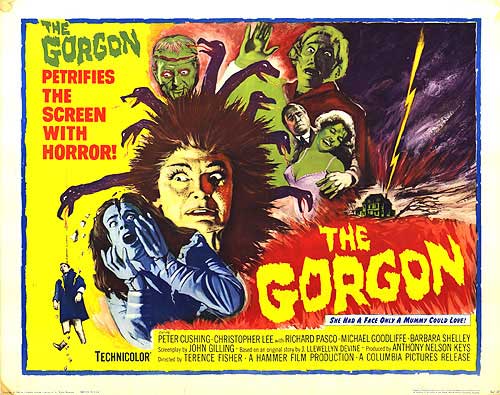
THE GORGON
UK, 1964, 83 minutes, Colour.
Christopher Lee, Peter Cushing, Richard Pasco, Barbara Shelley, Michael Goodliffe, Patrick Troughton, Prudence Hyman, Jack Watson.
Directed by Terence Fisher.
Terence Fisher directed Hammer Films’ leading productions on Dracula and Frankenstein in the late 50s. He also directed The Mummy and continued to direct features over the next twenty years for Hammer. He is said to have directed Peter Cushing in fourteen films.
This is a variation on Greek mythology, that of the Medusa and the gorgon.
The premise is that the gorgon is reincarnated in an early 20th century woman who goes to a German village, turning some of the inhabitants to stone. Peter Cushing portrays the doctor who realises the secret and is trying to protect the young woman, played rather demurely by Barbara Shelley (who is not so demure in other horror films). Richard Pasco is the hero infatuated with her. Christopher Lee portrays his professor, coming from Leipzig to investigate the situation.
Terence Fisher was a director of drama as well as horror and this is evident in this film. In fact, the horror elements are quite limited, the most effective being the victims turning to stone. Economic reasons meant that the Medusa/gorgon herself is not as horrifying as the screenplay suggests.
However, as a horror film it is quite effective, given the more elegant treatment by Terence Fisher.
1. The popularity of the Hammer horror films? The late 50s and the 60s? The trademark and audience expectations?
2. The German setting, the beginning of the 20th century? Yet the old-fashioned 19th century look? The village, the inn, the laboratories, the ruins of the castle? Authentic atmosphere? The musical score?
3. The premise of the gorgon, incarnate in a young woman in Germany in 1910? Audiences accepting this premise? The background of the gorgon legend, turning those who beheld her into stone? Her being defeated by decapitation – and people not affected by looking at her reflection only? How well used in this film?
4. The village: the young man, his fiancée, her turning into stone, the accusations against him, the police investigation? His killing himself? His father coming and confronting the police? The doctor? His own investigations, finding the gorgon, being turned into stone – but writing the letter to his son before he left?
5. Peter Cushing as the doctor, the laboratory? His being assisted by Carla? Her character, arrival in the village? Demure? Her amnesia? The doctor trying to protect her? Her memorising the legend of the gorgon to speak to Paul, the doctor wanting to read the letter his father wrote him? Her bewilderment about herself?
6. The victim’s father, his character, confrontation of the police, the police state? The people of the village attacking him? His confronting the gorgon, his letter, his death?
7. The police, suspicious, protective of the village? The confrontations? Especially with Professor Meister?
8. Ratoff and the institution, the doctor getting him to protect Carla? His attack on Paul?
9. The professor, his coming from Leipzig? His peremptory manner? Confronting Paul, suspecting the truth? Wanting to see the doctor? The conflict with the police? His trying to protect Paul, Paul’s infatuation, obsession, escape? The professor going to the castle, seeing Paul, seeing the gorgon from the back, the sword and the decapitation?
10. The gorgon herself, the makeup, less than horrifying? Her being transformed at the end into Carla?
11. The doctor, seeming sinister, not wanting to be sinister, his concern and protection, infatuation with Carla? His going to the castle, his being turned to stone?
12. The film as a drama about relationships and interactions? The horror elements?